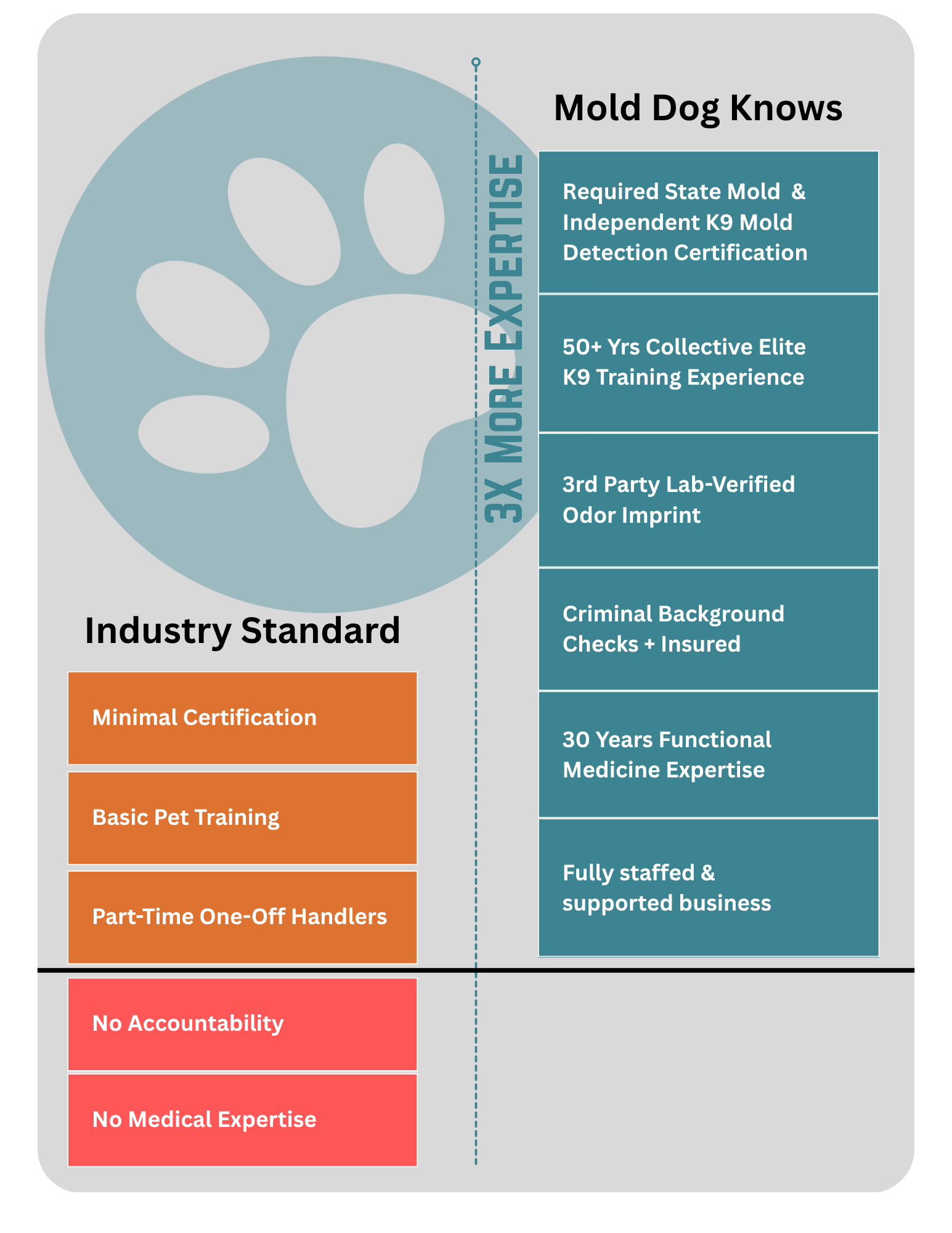
The ONLY Medically Aligned
AWDA Certified K9s Sniffing Out Mold Gasses
Doctor-founded K9 detection rooted in mold-literate medicine,
so you can stop guessing and start healing

"After two expensive inspections by other companies that came back negative, Mold Dog Knows found hidden mold behind walls we never suspected." -Jerry S.
Service Areas
Texas
- + Arkansas, Louisiana, Oklahoma, Mississippi
Tennessee
- + Georgia
South Carolina
- + North Carolina
Southwest Virginia
Kentucky
Louisiana
- + Oklahoma, Arkansas, Mississippi
Oregon
- + Washington, Northern California
Illinois
- + Wisconsin, Indiana, Iowa, Missouri
Nevada
- + California, Arizona, Utah
Ohio
- + Pennsylvania, Indiana, Kentucky, West Virginia
Many homeowners are living with invisible toxic mold
that’s causing chronic illness

Are you struggling with:
Being told "it's all in your head" when you know something in your home is making you sick?
Constant fatigue, brain fog, migraines and other unexplained cycling symptoms?
Spending thousands on home inspections and mold tests that find nothing?
Feeling overwhelmed by conflicting advice and questionable remediation quotes?
Living in fear that your home—your safe place—is actually making you sick?
You deserve concrete evidence about what's really happening in your space

Feel Validated
End the cycle of dismissal with concrete evidence confirming your concerns were valid all along.

Restore Health
Create an environment that allows your body to heal and your symptoms to finally subside.

Move Forward
Leave the exhausting limbo of uncertainty behind and plan for your future again.
I get it. Being sick while everyone tells you, "the tests are normal" is beyond frustrating.

I know you want to be a healthy, thriving person who feels safe in your own home again. In order to do that, you need to definitively identify if hidden toxic mold is causing your health problems.
The problem is most conventional inspectors miss hidden mold completely, or dismiss your concerns as paranoia. This can leave you feeling invalidated, frustrated and all alone, not to mention sick.
I believe every family deserves to breathe freely in a home that supports their wellbeing. Having navigated my own devastating journey through toxic mold illness, I understand firsthand the frustration of this path. That's why I've made it my mission to help mold-sensitive people, just like you, uncover the exact source of their toxic exposure so they can take precise action and reclaim their health.
Here's what makes us different from the rest:
Our handlers combine 50+ years of elite law enforcement and military K9 training expertise —not just pet owners with minimal certification.
Every team member is dual-certified: not only independently certified by the American Working Dog Association (AWDA) for K9 mold detection, but also professionally accredited in Mold Assessment. This is a sharp contrast to many competitors who rely on minimally trained handlers with no third-party oversight.
Our K9s undergo rigorous lab-verified odor imprinting specifically for toxic mold gases, while most services use general-purpose trained dogs
We're guided by a mold-literate doctor with 30 years in functional medicine and personal toxic mold recovery experience, providing medical context others lack.
Our empathetic approach stems from our founder’s lived mold-illness experience, offering validation and understanding that technical inspectors can't provide.
Together, we'll turn confusion into clarity and give you back control of your health and home.


Owner/CEO, Mold Dog Knows
105
5 Star Google Reviews of
Client Transformations

Team of Certified Mold Assessment Technicians
50+
Years Combined K9 Odor
Detection Experience
Here's how it works

1 - Book Your Free Mold Detection Consult
We'll discuss your concerns, symptoms, and goals to create a personalized assessment approach.
2 - Get Accurate K9 Detection
Our elite detection dogs and their experienced handlers will identify gasses as released by active hidden toxic mold with remarkable accuracy during our visit.
3 - Regain Control of Your Life
Walk away with clear evidence, an action plan, and restored hope for your home and health.

“My wife and son were sick for months. Now we finally have validation and a clear path forward. This K9 team's precision is truly the gold standard in mold detection.”
-Jerry S.

Mold Dog Buck found five problem areas in my home, including two I never suspected. When I investigated one spot after they left, I poked right through soft drywall indicating water damage. Their K9 team provided expertise that finally gave us answers after months of uncertainty.
- Rochelle A.

The team identified water damage our regular home inspector completely missed—including a tiny leak deep inside the house. I've already recommended Mold Dog Knows to multiple friends with chronic health issues. This inspection is absolutely crucial when purchasing property and seeking answers about unexplained symptoms.
- Emily A.

I was skeptical about mold detection dogs until experiencing Mold Dog Knows work. Now I trust them more than any other inspector or test I've used. They saved us countless hours and thousands of dollars while giving us the peace of mind to make informed decisions about our home.
- C. N.
The Mold Dog Knows Elite Detection Advantage

In the News & At Work
In the News & At Work
Don't spend another year with unexplained symptoms and mounting medical bills
Together, we'll help uncover the sources of toxic mold in your home so you can make
targeted, effective decisions and finally start healing in a truly safe environment.
Services Include

Residential Mold Detection
Our elite K9 team thoroughly scours your home in 1-2 hours, marking exact suspected active mold locations to support the accuracy of your mold inspection and remediation. Includes detailed alert report, recommendations for prevention, and health recovery.

Office Mold Detection
Protect your workplace environment with our precise commercial active mold off-gas detection ensuring employee health and business continuity. Our team provides precise locations of suspected contamination and comprehensive report with guidance tailored for commercial spaces.

RV Mold Detection
RVs and trailers are particularly susceptible to hidden active mold that can compromise your travel experience and health. Our specialized K9 detection pinpoints all suspected contamination areas and delivers practical solutions for these unique environments.

Vehicle Mold Detection
Available as an add-on to home or office inspections, our vehicle assessment identifies potential hidden active mold affecting your car's environment. Includes specific recommendations for maintaining a mold-free vehicle and protecting your health during commutes.
Pricing varies by property size and location.
Services Include

Residential Mold Detection
Our elite K9 team thoroughly scours your home in 1-2 hours, marking exact suspected mold locations to support the accuracy of your mold inspection and remediation. Includes detailed alert report, recommendations for prevention, and health recovery.

Office Mold Detection
Protect your workplace environment with our precise commercial mold off-gas detection ensuring employee health and business continuity. Our team provides precise locations of suspected contamination and comprehensive report with guidance tailored for commercial spaces.

RV Mold Detection
RVs and trailers are particularly susceptible to hidden mold that can compromise your travel experience and health. Our specialized K9 detection pinpoints all suspected contamination areas and delivers practical solutions for these unique environments.
Pricing varies by property size and location. Available in Texas, Oklahoma, Louisiana and Arkansas regions with potential travel accommodations for other areas.
COPYRIGHT © 2025 MOLD DOG KNOWS






